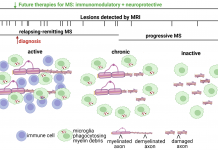Open Access Government produces compelling and informative news, publications, eBooks, and academic research articles for the public and private sector looking at health, diseases & conditions, workplace, research & innovation, digital transformation, government policy, environment, agriculture, energy, transport and more.
Home 2023
Archives
Targeting the central nervous system: The future of therapeutic strategies for MS
Tara M. DeSilva from the Department of Neurosciences, Cleveland Clinic, looks at the future of therapeutic strategies for MS, focusing on targeting the central nervous system.
Great leaps in multiple sclerosis treatment but the holy grail is still ahead
CEO of MS Australia Rohan Greenland highlights the breakthroughs in treating attacks on the brain and spinal cord in multiple sclerosis (MS). But his sights are set firmly on the great unmet needs: to repair damaged nerves, reverse disability, and ultimately, prevent MS.
Remyelinating versus neuroprotective therapies for multiple sclerosis
Reducing clinical relapses and improving quality of life is at the heart of MS treatment; here Tara M. DeSilva explores the benefits of remyelinating versus neuroprotective therapies for tackling MS.




